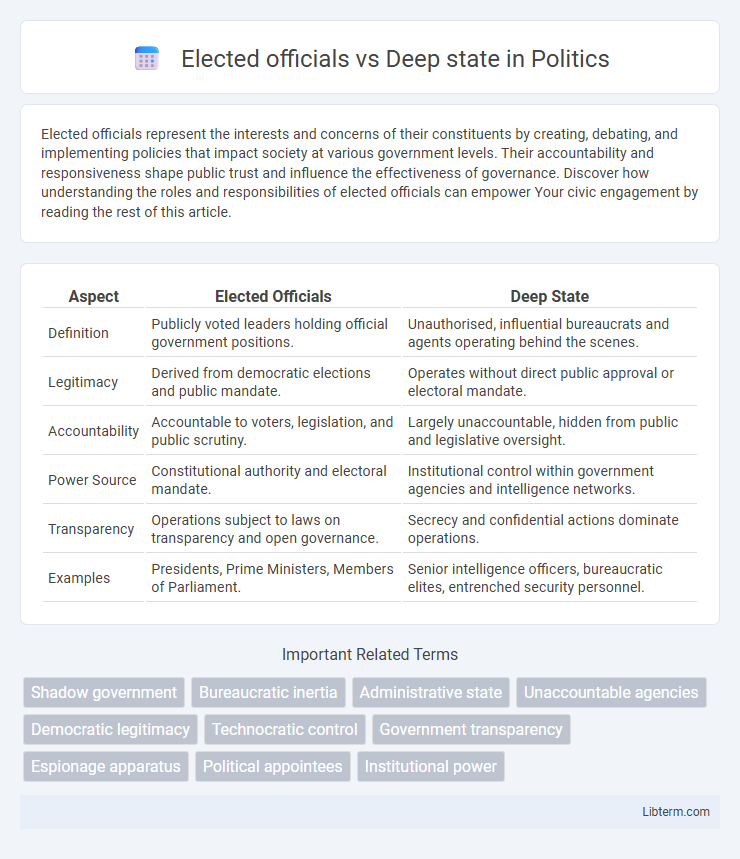Elected officials represent the interests and concerns of their constituents by creating, debating, and implementing policies that impact society at various government levels. Their accountability and responsiveness shape public trust and influence the effectiveness of governance. Discover how understanding the roles and responsibilities of elected officials can empower Your civic engagement by reading the rest of this article.
Table of Comparison
| Aspect | Elected Officials | Deep State |
|---|---|---|
| Definition | Publicly voted leaders holding official government positions. | Unauthorised, influential bureaucrats and agents operating behind the scenes. |
| Legitimacy | Derived from democratic elections and public mandate. | Operates without direct public approval or electoral mandate. |
| Accountability | Accountable to voters, legislation, and public scrutiny. | Largely unaccountable, hidden from public and legislative oversight. |
| Power Source | Constitutional authority and electoral mandate. | Institutional control within government agencies and intelligence networks. |
| Transparency | Operations subject to laws on transparency and open governance. | Secrecy and confidential actions dominate operations. |
| Examples | Presidents, Prime Ministers, Members of Parliament. | Senior intelligence officers, bureaucratic elites, entrenched security personnel. |
Introduction: Understanding Elected Officials and the Deep State
Elected officials are public servants chosen through democratic processes to represent citizens and enact policies, while the deep state refers to a network of entrenched bureaucrats and operatives who exert influence behind the scenes regardless of electoral outcomes. Understanding the roles and dynamics between elected officials and the deep state is essential for analyzing governance, accountability, and the balance of power within political systems. This distinction highlights the tension between transparent political leadership and the opaque actions of non-elected entities influencing government decisions.
Defining Elected Officials: Roles and Responsibilities
Elected officials hold formal authority granted by voters to create, implement, and enforce public policies within governmental institutions. Their responsibilities include representing constituents' interests, legislating laws, overseeing budgets, and ensuring accountability in public administration. Unlike the concept of the "deep state," elected officials operate transparently within democratic frameworks and are subject to electoral processes and legal checks.
What is the Deep State? Origins and Meaning
The Deep State refers to a covert network of influential members within government agencies, intelligence services, and military institutions who operate independently of elected officials to influence policy and maintain control. Originating from the concept of entrenched bureaucratic power, the term gained prominence in political discourse during the late 20th century, especially in countries with complex power structures such as Turkey, and later the United States. The Deep State embodies a shadow government dynamic, often perceived as obstructing democratic processes by prioritizing institutional interests over public mandates.
Historical Context: Evolution of the Deep State Concept
The concept of the Deep State traces back to early 20th-century Turkey, where clandestine networks within the military and intelligence agencies operated independently of elected officials. Over time, the term expanded globally to describe entrenched bureaucracies and shadowy groups influencing government policy beyond democratic oversight. Historical analysis reveals a persistent tension between publicly accountable elected officials and hidden power structures shaping state decisions behind the scenes.
Key Differences: Authority, Accountability, and Influence
Elected officials derive their authority from democratic processes, making them directly accountable to voters and governed by legal frameworks that ensure transparency. The deep state operates through a network of entrenched bureaucrats and intelligence agencies wielding covert influence, often lacking direct public accountability and functioning beyond typical oversight mechanisms. Authority in elected officials is formal and temporary, whereas the deep state wields persistent, informal power that can significantly shape policy and governance without electoral legitimacy.
Interactions Between Elected Officials and Deep State Actors
Interactions between elected officials and deep state actors often occur through informal networks and bureaucratic channels, influencing policy decisions beyond public oversight. Deep state actors, embedded within intelligence agencies, military, and civil service, may exert covert pressure or provide selective information to shape governmental outcomes. This dynamic creates a complex interplay where official mandates and hidden agendas intersect, impacting transparency and democratic accountability.
Public Perception: Trust, Transparency, and Legitimacy
Public perception of elected officials often hinges on trust, transparency, and legitimacy, shaping confidence in democratic governance. The notion of a "deep state" fuels skepticism by suggesting hidden agendas and unaccountable influences behind policy decisions. Surveys indicate that higher transparency and clear communication enhance trust in elected representatives, while perceived deep state activity erodes legitimacy and public faith in government institutions.
Case Studies: High-Profile Clashes and Collaborations
High-profile clashes between elected officials and the deep state often emerge in cases such as the Watergate scandal, where investigative agencies resisted political pressures to expose corruption. Collaborative efforts have surfaced during national security crises, exemplified by bipartisan coordination post-9/11, involving intelligence agencies and congressional leaders to enhance counterterrorism measures. These case studies reveal complex interactions between visible political authority and entrenched bureaucratic power structures influencing policy and governance.
The Impact on Policy and Governance
Elected officials hold formal authority to shape policies through democratic mandates, while the deep state, comprising bureaucrats and intelligence officials, can covertly influence decision-making and maintain institutional continuity. This dynamic often leads to tension in governance, as unelected actors may resist or modify elected officials' agendas, impacting policy implementation and transparency. Understanding the interplay between these entities is crucial for analyzing power distribution and accountability within government systems.
Future Implications: Democracy, Power, and Institutional Balance
Elected officials represent democratic mandates, while the deep state operates through entrenched bureaucratic power, creating tensions that could undermine transparent governance. The future implications for democracy include potential erosion of accountability as unelected institutions influence policy and decision-making behind the scenes. Maintaining institutional balance requires robust legal frameworks and civic vigilance to ensure elected representatives retain authority and democratic principles prevail.
Elected officials Infographic

 libterm.com
libterm.com